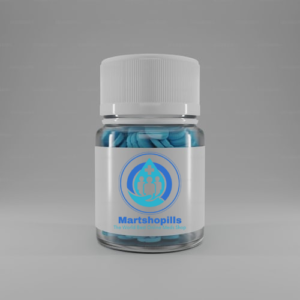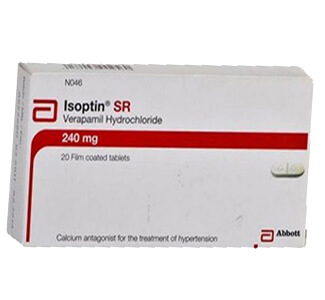Description
Isoptin (Verapamil) 240mg Tablets
Isoptin (Verapamil) is a medication that belongs to the class of calcium channel blockers. It is commonly used for the treatment of high blood pressure (hypertension) and angina pectoris (chest pain). This document will provide a brief overview of Isoptin (Verapamil), including its uses, dosage, and potential side effects.
Uses
Isoptin (Verapamil) is primarily prescribed to manage hypertension (high blood pressure). It works by relaxing the blood vessels, which helps to lower blood pressure. Isoptin (Verapamil) is also prescribed to treat angina pectoris, a condition characterized by chest pain due to inadequate blood flow to the heart muscle. It helps improve blood flow to the heart, relieving chest pain.
Dosage
The recommended starting dose of Isoptin (Verapamil) for hypertension is 240 mg once daily. The dosage may be adjust according to individual needs and response to the medication. The maximum recommend daily dose is 480 mg. For angina pectoris, the starting dose is typically 80 mg to 120 mg every four to six hours as needed for chest pain. The dosage may be adjusted based on individual response and tolerance.
Side Effects
While Isoptin (Verapamil) is generally well tolerated, some individuals may experience side effects. These may include:
1. Headache: Headache is a common side effect of Isoptin (Verapamil). It typically resolves on its own over time.
2. Digestive issues: Some individuals may experience gastrointestinal symptoms such as nausea, vomiting, and diarrhea.
3. Low blood pressure: Isoptin (Verapamil) can cause dizziness or lightheadedness when standing up quickly. It is important to get up slowly to minimize this effect.
4. Heart rhythm disturbances: Isoptin (Verapamil) can occasionally cause changes in the normal rhythm of the heart (arrhythmias). However, this side effect is uncommon.
5. Weakness: Weakness and fatigue can occur in some individuals taking Isoptin (Verapamil).
Conclusion
Isoptin (Verapamil) 240mg Tablets is a medication commonly uses to manage hypertension and angina pectoris. Its primary mechanism of action is to relax the blood vessels, improving blood flow and lowering blood pressure. While generally well tolerated, some individuals may experience side effects such as headache, digestive issues, low blood pressure, heart rhythm disturbances, and weakness. It is important to discuss any side effects or concerns with your healthcare provider.




Leilani (verified owner) –
I want to say thanks to the support team for helping with my continuously silly questions, you’re the best!
Allie (verified owner) –
I am very happy with your service and I will tell people to buy your products from here.
Caleigh (verified owner) –
Been using it for a while, I usually don’t write a review but this time I am truly convinced to write.
Roxanne (verified owner) –
Thank you for answering my questions correctly and delivering my order to me.
Tomasa (verified owner) –
Your product is good and of excellent quality and the delivery was also done promptly. I demand people to use it. It has excellent results.
Rigoberto (verified owner) –
Your UK to UK shipping service is very high.
Laurel (verified owner) –
You really fulfilled your guarantee. You said the order would arrive within five days, and I really did receive my order.
Tatum (verified owner) –
I am 100% satisfied with your service.
Russel (verified owner) –
I was very confused but you reassured me and understood my concerns and helped me get the order to me.
Myrna (verified owner) –
Good response from the support.
Reggie (verified owner) –
This is the coolest thing I’ve found on here! Will keep using your products in the future!
Dudley (verified owner) –
Thank you for answering my questions correctly and delivering my order to me.
Mustafa (verified owner) –
Been using a lot of items, this one is obviously the best
Kris (verified owner) –
I was very disappointed before, but when I came to your website, I found more hope and comfort in you.
Linda (verified owner) –
An awesome product with great flexibility. The customer support is superb. I recommend this without any doubt.
Magali (verified owner) –
This is the best support for a product I had so far, they reply quickly and solve themselves the problems most of the time. Kudos guyz
Lila (verified owner) –
This is the coolest thing I’ve found on here! Will keep using your products in the future!
Reanna (verified owner) –
I like this item and also the customer service of them.
Neoma (verified owner) –
This is the coolest thing I’ve found on here! Will keep using your products in the future!
Elmer (verified owner) –
I was very disappointed before, but when I came to your website, I found more hope and comfort in you.
Alphonso (verified owner) –
Been using a lot of items, this one is obviously the best
Maria (verified owner) –
I was very disappointed before, but when I came to your website, I found more hope and comfort in you.
Christophe (verified owner) –
The item and the design are very cool. Also the support is amazing, they always help you with any detail that you have.
Alexandria (verified owner) –
I rarely leave a comment, but this item is beyond worth it! Gotta let you guys know!
Terrill (verified owner) –
I was very confused but you reassured me and understood my concerns and helped me get the order to me.
Martin (verified owner) –
Your product is excellent and has good results.
Iliana (verified owner) –
Your product is good and of excellent quality and the delivery was also done promptly. I demand people to use it. It has excellent results.
Kiarra (verified owner) –
Your product is excellent and has good results.
Jodie (verified owner) –
I was very disappointed before, but when I came to your website, I found more hope and comfort in you.
August (verified owner) –
Great item! It provides too many things compared to its price charged.